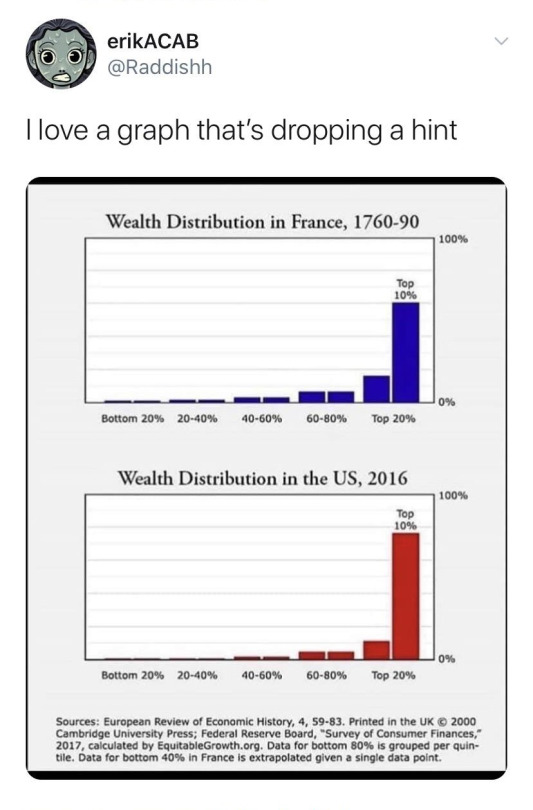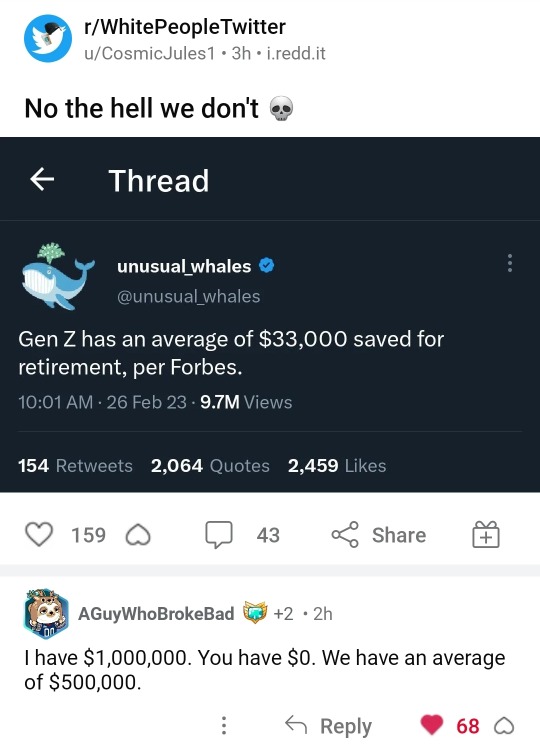#economics
Text

2K notes
·
View notes
Video
youtube
The Truth About Trumponomics
Trump and Republicans want to wreck your bank account. Here are 5 things you need to know about Trumponomics.
1.Trump wants tax cuts for the rich, at your expense.
Trump’s tax cuts for the rich and big corporations added about $1.7 trillion to the national debt, with few benefits trickling down to the middle class — in fact, it raised taxes for more than 10 million American families.
Now Trump and Republicans want to make the tax cuts for the rich permanent, blowing up the debt even further. And then they’ll use that debt to justify this:
2. Trump would cut Social Security and Medicare — programs you’ve been paying into!
In every year of his presidency, Trump submitted a budget that tried to cut Social Security and Medicare. And he knows that’s the only way he can even begin to pay for extending his tax cuts for the rich.
3. Trump and his allies are pro-junk fee.
When the Biden administration issued a rule capping credit card late fees at $8, Sen. Tim Scott, a Trump surrogate, tried to overturn it in the Senate. And then a Trump-appointed judge issued a temporary injunction that blocked the rule from taking effect. Eliminating that rule would cost American families an estimated $10 billion a year.
And when the Biden administration required airlines to issue automatic refunds for canceled flights, Trump’s allies in Congress fought to block that too.
When Trump was in office, his administration fought against efforts to rein in airline junk fees.
Corporations nickel and diming us like this makes inflation worse. If Trump gets back in the White House, buckle up for more junk fees.
4. Trump would send health care costs soaring.
Republicans have committed to repealing the Inflation Reduction Act, which would strip Medicare of the ability to negotiate drug prices, and let Big Pharma send the price of insulin and other life-saving medicines back through the roof.
And Trump is still fixated on repealing Obamacare, with no plan to replace it.
TRUMP: Obamacare is a disaster. We’re gonna do something about it.
That would strip coverage from tens of millions of Americans, drive up premiums, and let insurers charge more or deny coverage to people with preexisting conditions.
5, If you’ve got student debt, you’re out of luck with Trump.
In contrast to President Biden, who’s canceled more than $160 billion of student debt so far, Trump is against student debt relief. In his first term, he tried to eliminate the popular Public Service Loan Forgiveness program for people like teachers and nurses, and he’s called the idea of debt relief “unfair.”
What’s unfair, is how student debt hurts not just the roughly 40 million Americans burdened by it, but the entire economy, since Americans with debt have less money to spend, are less likely to start a business, less likely to buy a home, and more likely to rely on government assistance.
The MAGA agenda would make nearly every aspect of your life more expensive, while making the richest Americans even richer.
Teddy Roosevelt’s economic plan was called the Square Deal. Franklin Roosevelt’s was the New Deal.
What Trump is offering is simply a Raw Deal.
385 notes
·
View notes
Text
“what oppression do women face? what rights don’t they already have?” let me explain something very simple to you. having laws that permit women to have jobs, divorce men, abort, or kill in self-defense is literally 25% of the battle. why? because of infrastructure and societal bias.
for example, it is technically illegal to rape (legislation) yet few rapists are ever convicted and even if they are, their sentences never match the crime. why? for one, it’s hard for girls and women of challenging socioeconomic backgrounds to access services or resources like rape kits or information on how to seek legal assistance; and in the course of this, the police men are likely to sexually abuse them as well, resulting in more trauma and reducing their chances at seeking justice (infrastructure). even if a woman were to get a job (and the law doesn’t allow discrimination), if the social bias is that she can’t perform well, she is still less likely to be hired. if she is hired, she is more likely to be underpaid (read up on the velvet or pink ghetto).
government (legislation and judiciary) are reflective of social consciousness. they may agree with the rights of women (sometimes) on paper, but whether or not they are meaningfully enforced is completely up to those with the most socioeconomic power, which, for now, is largely still men (in that men maintain most of the wealth, property, and high opinion in a populace, they also control most popular metanarratives via religion, education, pornography and entertainment which means they largely control public perception). because men in patriarchal society keep their resources to themselves and seek to elevate only themselves. racism can be illegal, and still rampant, in a country. so it is with misogyny and homophobia.
if men hate women in a system that has long been organized to benefit them, a few legislative changes won’t automatically change that system. it has to be altered structurally and socially as well.
and that takes a whole lot more fighting
160 notes
·
View notes
Text
Real innovation vs Silicon Valley nonsense

This is the LAST DAY to get my bestselling solarpunk utopian novel THE LOST CAUSE (2023) as a $2.99, DRM-free ebook!

If there was any area where we needed a lot of "innovation," it's in climate tech. We've already blown through numerous points-of-no-return for a habitable Earth, and the pace is accelerating.
Silicon Valley claims to be the epicenter of American innovation, but what passes for innovation in Silicon Valley is some combination of nonsense, climate-wrecking tech, and climate-wrecking nonsense tech. Forget Jeff Hammerbacher's lament about "the best minds of my generation thinking about how to make people click ads." Today's best-paid, best-trained technologists are enlisted to making boobytrapped IoT gadgets:
https://pluralistic.net/2024/05/24/record-scratch/#autoenshittification
Planet-destroying cryptocurrency scams:
https://pluralistic.net/2024/02/15/your-new-first-name/#that-dagger-tho
NFT frauds:
https://pluralistic.net/2022/02/06/crypto-copyright-%f0%9f%a4%a1%f0%9f%92%a9/
Or planet-destroying AI frauds:
https://pluralistic.net/2024/01/29/pay-no-attention/#to-the-little-man-behind-the-curtain
If that was the best "innovation" the human race had to offer, we'd be fucking doomed.
But – as Ryan Cooper writes for The American Prospect – there's a far more dynamic, consequential, useful and exciting innovation revolution underway, thanks to muscular public spending on climate tech:
https://prospect.org/environment/2024-05-30-green-energy-revolution-real-innovation/
The green energy revolution – funded by the Bipartisan Infrastructure Act, the Inflation Reduction Act, the CHIPS Act and the Science Act – is accomplishing amazing feats, which are barely registering amid the clamor of AI nonsense and other hype. I did an interview a while ago about my climate novel The Lost Cause and the interviewer wanted to know what role AI would play in resolving the climate emergency. I was momentarily speechless, then I said, "Well, I guess maybe all the energy used to train and operate models could make it much worse? What role do you think it could play?" The interviewer had no answer.
Here's brief tour of the revolution:
2023 saw 32GW of new solar energy come online in the USA (up 50% from 2022);
Wind increased from 118GW to 141GW;
Grid-scale batteries doubled in 2023 and will double again in 2024;
EV sales increased from 20,000 to 90,000/month.
https://www.whitehouse.gov/briefing-room/blog/2023/12/19/building-a-thriving-clean-energy-economy-in-2023-and-beyond/
The cost of clean energy is plummeting, and that's triggering other areas of innovation, like using "hot rocks" to replace fossil fuel heat (25% of overall US energy consumption):
https://rondo.com/products
Increasing our access to cheap, clean energy will require a lot of materials, and material production is very carbon intensive. Luckily, the existing supply of cheap, clean energy is fueling "green steel" production experiments:
https://www.wdam.com/2024/03/25/americas-1st-green-steel-plant-coming-perry-county-1b-federal-investment/
Cheap, clean energy also makes it possible to recover valuable minerals from aluminum production tailings, a process that doubles as site-remediation:
https://interestingengineering.com/innovation/toxic-red-mud-co2-free-iron
And while all this electrification is going to require grid upgrades, there's lots we can do with our existing grid, like power-line automation that increases capacity by 40%:
https://www.npr.org/2023/08/13/1187620367/power-grid-enhancing-technologies-climate-change
It's also going to require a lot of storage, which is why it's so exciting that we're figuring out how to turn decommissioned mines into giant batteries. During the day, excess renewable energy is channeled into raising rock-laden platforms to the top of the mine-shafts, and at night, these unspool, releasing energy that's fed into the high-availability power-lines that are already present at every mine-site:
https://www.euronews.com/green/2024/02/06/this-disused-mine-in-finland-is-being-turned-into-a-gravity-battery-to-store-renewable-ene
Why are we paying so much attention to Silicon Valley pump-and-dumps and ignoring all this incredible, potentially planet-saving, real innovation? Cooper cites a plausible explanation from the Apperceptive newsletter:
https://buttondown.email/apperceptive/archive/destructive-investing-and-the-siren-song-of/
Silicon Valley is the land of low-capital, low-labor growth. Software development requires fewer people than infrastructure and hard goods manufacturing, both to get started and to run as an ongoing operation. Silicon Valley is the place where you get rich without creating jobs. It's run by investors who hate the idea of paying people. That's why AI is so exciting for Silicon Valley types: it lets them fantasize about making humans obsolete. A company without employees is a company without labor issues, without messy co-determination fights, without any moral consideration for others. It's the natural progression for an industry that started by misclassifying the workers in its buildings as "contractors," and then graduated to pretending that millions of workers were actually "independent small businesses."
It's also the natural next step for an industry that hates workers so much that it will pretend that their work is being done by robots, and then outsource the labor itself to distant Indian call-centers (no wonder Indian techies joke that "AI" stands for "absent Indians"):
https://pluralistic.net/2024/05/17/fake-it-until-you-dont-make-it/#twenty-one-seconds
Contrast this with climate tech: this is a profoundly physical kind of technology. It is labor intensive. It is skilled. The workers who perform it have power, both because they are so far from their employers' direct oversight and because these fed-funded sectors are more likely to be unionized than Silicon Valley shops. Moreover, climate tech is capital intensive. All of those workers are out there moving stuff around: solar panels, wires, batteries.
Climate tech is infrastructural. As Deb Chachra writes in her must-read 2023 book How Infrastructure Works, infrastructure is a gift we give to our descendants. Infrastructure projects rarely pay for themselves during the lives of the people who decide to build them:
https://pluralistic.net/2023/10/17/care-work/#charismatic-megaprojects
Climate tech also produces gigantic, diffused, uncapturable benefits. The "social cost of carbon" is a measure that seeks to capture how much we all pay as polluters despoil our shared world. It includes the direct health impacts of burning fossil fuels, and the indirect costs of wildfires and extreme weather events. The "social savings" of climate tech are massive:
https://arstechnica.com/science/2024/05/climate-and-health-benefits-of-wind-and-solar-dwarf-all-subsidies/
For every MWh of renewable power produced, we save $100 in social carbon costs. That's $100 worth of people not sickening and dying from pollution, $100 worth of homes and habitats not burning down or disappearing under floodwaters. All told, US renewables have delivered $250,000,000,000 (one quarter of one trillion dollars) in social carbon savings over the past four years:
https://arstechnica.com/science/2024/05/climate-and-health-benefits-of-wind-and-solar-dwarf-all-subsidies/
In other words, climate tech is unselfish tech. It's a gift to the future and to the broad public. It shares its spoils with workers. It requires public action. By contrast, Silicon Valley is greedy tech that is relentlessly focused on the shortest-term returns that can be extracted with the least share going to labor. It also requires massive public investment, but it also totally committed to giving as little back to the public as is possible.
No wonder America's richest and most powerful people are lining up to endorse and fund Trump:
https://prospect.org/blogs-and-newsletters/tap/2024-05-30-democracy-deshmocracy-mega-financiers-flocking-to-trump/
Silicon Valley epitomizes Stafford Beer's motto that "the purpose of a system is what it does." If Silicon Valley produces nothing but planet-wrecking nonsense, grifty scams, and planet-wrecking, nonsensical scams, then these are all features of the tech sector, not bugs.
As Anil Dash writes:
Driving change requires us to make the machine want something else. If the purpose of a system is what it does, and we don’t like what it does, then we have to change the system.
https://www.anildash.com/2024/05/29/systems-the-purpose-of-a-system/
To give climate tech the attention, excitement, and political will it deserves, we need to recalibrate our understanding of the world. We need to have object permanence. We need to remember just how few people were actually using cryptocurrency during the bubble and apply that understanding to AI hype. Only 2% of Britons surveyed in a recent study use AI tools:
https://www.bbc.com/news/articles/c511x4g7x7jo
If we want our tech companies to do good, we have to understand that their ground state is to create planet-wrecking nonsense, grifty scams, and planet-wrecking, nonsensical scams. We need to make these companies small enough to fail, small enough to jail, and small enough to care:
https://pluralistic.net/2024/04/04/teach-me-how-to-shruggie/#kagi
We need to hold companies responsible, and we need to change the microeconomics of the board room, to make it easier for tech workers who want to do good to shout down the scammers, nonsense-peddlers and grifters:
https://pluralistic.net/2023/07/28/microincentives-and-enshittification/
Yesterday, a federal judge ruled that the FTC could hold Amazon executives personally liable for the decision to trick people into signing up for Prime, and for making the unsubscribe-from-Prime process into a Kafka-as-a-service nightmare:
https://arstechnica.com/tech-policy/2024/05/amazon-execs-may-be-personally-liable-for-tricking-users-into-prime-sign-ups/
Imagine how powerful a precedent this could set. The Amazon employees who vociferously objected to their bosses' decision to make Prime as confusing as possible could have raised the objection that doing this could end up personally costing those bosses millions of dollars in fines:
https://pluralistic.net/2023/09/03/big-tech-cant-stop-telling-on-itself/
We need to make climate tech, not Big Tech, the center of our scrutiny and will. The climate emergency is so terrifying as to be nearly unponderable. Science fiction writers are increasingly being called upon to try to frame this incomprehensible risk in human terms. SF writer (and biologist) Peter Watts's conversation with evolutionary biologist Dan Brooks is an eye-opener:
https://thereader.mitpress.mit.edu/the-collapse-is-coming-will-humanity-adapt/
They draw a distinction between "sustainability" meaning "what kind of technological fixes can we come up with that will allow us to continue to do business as usual without paying a penalty for it?" and sustainability meaning, "what changes in behavior will allow us to save ourselves with the technology that is possible?"
Writing about the Watts/Brooks dialog for Naked Capitalism, Yves Smith invokes William Gibson's The Peripheral:
With everything stumbling deeper into a ditch of shit, history itself become a slaughterhouse, science had started popping. Not all at once, no one big heroic thing, but there were cleaner, cheaper energy sources, more effective ways to get carbon out of the air, new drugs that did what antibiotics had done before…. Ways to print food that required much less in the way of actual food to begin with. So everything, however deeply fucked in general, was lit increasingly by the new, by things that made people blink and sit up, but then the rest of it would just go on, deeper into the ditch. A progress accompanied by constant violence, he said, by sufferings unimaginable.
https://www.nakedcapitalism.com/2024/05/preparing-for-collapse-why-the-focus-on-climate-energy-sustainability-is-destructive.html
Gibson doesn't think this is likely, mind, and even if it's attainable, it will come amidst "unimaginable suffering."
But the universe of possible technologies is quite large. As Chachra points out in How Infrastructure Works, we could give every person on Earth a Canadian's energy budget (like an American's, but colder), by capturing a mere 0.4% of the solar radiation that reaches the Earth's surface every day. Doing this will require heroic amounts of material and labor, especially if we're going to do it without destroying the planet through material extraction and manufacturing.
These are the questions that we should be concerning ourselves with: what behavioral changes will allow us to realize cheap, abundant, green energy? What "innovations" will our society need to focus on the things we need, rather than the scams and nonsense that creates Silicon Valley fortunes?
How can we use planning, and solidarity, and codetermination to usher in the kind of tech that makes it possible for us to get through the climate bottleneck with as little death and destruction as possible? How can we use enforcement, discernment, and labor rights to thwart the enshittificatory impulses of Silicon Valley's biggest assholes?

If you'd like an essay-formatted version of this post to read or share, here's a link to it on pluralistic.net, my surveillance-free, ad-free, tracker-free blog:
https://pluralistic.net/2024/05/30/posiwid/#social-cost-of-carbon
#pluralistic#ai#hype#anil dash#stafford beer#amazon#prime#scams#dark patterns#POSIWID#the purpose of a system is what it does#climate#economics#innovation#renewables#social cost of carbon#green energy#solar#wind#ryan cooper#peter watts#the jackpot#ai hype#chips act#ira#inflation reduction act#infrastructure#deb chachra
76 notes
·
View notes
Text
#thick blonde#tomioka giyuu#rainn#economics#2 broke girls#julie kennedy#moominvalley#coquette fashion#snoop dogg#malex#david bowie
121 notes
·
View notes
Text
#ashley benson#economics#snoop dogg#pun#draco x reader#birblr#alternative music#haikyuu scenarios#selling newds#city lights#sailing#sleeping with sirens#Christian Louboutin#male model#haikyuu fanart
120 notes
·
View notes
Text
#drake#memesdaily#thick blonde#tomioka giyuu#rainn#economics#2 broke girls#julie kennedy#coquette fashion#malex#maya rudolph#crystal#leia organa#nicole kidman#birblr
121 notes
·
View notes
Text
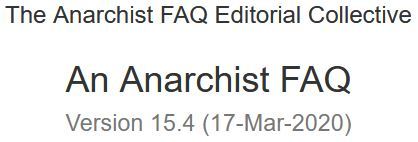
G.3 Is “anarcho”-capitalism a new form of individualist anarchism?
No. As Carole Pateman once pointed out, ”[t]here has always been a strong radical individualist tradition in the USA. Its adherents have been divided between those who drew anarchist, egalitarian conclusions, and those who reduced political life to the capitalist economy writ large, to a series of exchanges between unequally situated individuals.” [The Problem of Political Obligation, p. 205] What right-“libertarians” and “anarcho”-capitalists do is to confuse these two traditions, ignoring fundamental aspects of individualist anarchism in order to do so. Thus anarchist Peter Sabatini:
“in those rare moments when [Murray] Rothbard (or any other [right-wing] Libertarian) does draw upon individualist anarchism, he is always highly selective about what he pulls out. Most of the doctrine’s core principles, being decidedly anti-Libertarianism, are conveniently ignored, and so what remains is shrill anti-statism conjoined to a vacuous freedom in hackneyed defence of capitalism. In sum, the ‘anarchy’ of Libertarianism reduces to a liberal fraud.” [Libertarianism: Bogus Anarchy]
As class struggle anarchist Benjamin Franks notes individualist anarchism “has similarities with, but is not identical to, anarcho-capitalism.” [Rebel Alliances, p. 44] For Colin Ward, while the “mainstream” of anarchist propaganda “has been anarchist-communism” there are “several traditions of individualist anarchism”, including that associated with Max Stirner and “a remarkable series of 19th-century American figures” who “differed from free-market liberals in their absolute mistrust of American capitalism, and in their emphasis on mutualism.” Ward was careful to note that by the “late 20th century the word ‘libertarian’ . .. was appropriated by a new group of American thinkers” and so “it is necessary to examine the modern individualist ‘libertarian’ response from the standpoint of the anarchist tradition.” It was found to be wanting, for while Rothbard was “the most aware of the actual anarchist tradition among the anarcho-capitalist apologists” he may have been “aware of a tradition, but he is singularly unaware of the old proverb that freedom for the pike means death for the minnow.” The individualist anarchists were “busy social inventors exploring the potential of autonomy.” The “American ‘libertarians’ of the 20th century are academics rather than social activists, and their inventiveness seems to be limited to providing an ideology for untrammelled market capitalism.” [Anarchism: A Short Introduction, pp. 2–3, p. 62, p. 67, and p. 69]
In this section we will sketch these differences between the genuine libertarian ideas of Individualist Anarchism and the bogus “anarchism” of right-“libertarian” ideology. This discussion builds upon our general critique of “anarcho”-capitalism we presented in section F. However, here we will concentrate on presenting individualist anarchist analysis of “anarcho”-capitalist positions rather than, as before, mostly social anarchist ones (although, of course, there are significant overlaps and similarities). In this way, we can show the fundamental differences between the two theories for while there are often great differences between specific individualist anarchist thinkers all share a vision of a free society distinctly at odds with the capitalism of their time as well as the “pure” system of economic textbooks and right-“libertarian” dreams (which, ironically, so often reflects the 19th century capitalism the individualist anarchists were fighting).
First it should be noted that some “anarcho”-capitalists shy away from the term, preferring such expressions as “market anarchist” or “individualist anarchist.” This suggests that there is some link between their ideology and that of Tucker and his comrades. However, the founder of “anarcho”-capitalism, Murray Rothbard, refused that label for, while “strongly tempted,” he could not do so because “Spooner and Tucker have in a sense pre-empted that name for their doctrine and that from that doctrine I have certain differences.” Somewhat incredibly Rothbard argued that on the whole politically “these differences are minor,” economically “the differences are substantial, and this means that my view of the consequences of putting our more of less common system into practice is very far from theirs.” [“The Spooner-Tucker Doctrine: An Economist’s View”, pp. 5–15, Journal of Libertarian Studies, vol. 20, no. 1, p. 7]
What an understatement! Individualist anarchists advocated an economic system in which there would have been very little inequality of wealth and so of power (and the accumulation of capital would have been minimal without profit, interest and rent). Removing this social and economic basis would result in substantially different political regimes. In other words, politics is not isolated from economics. As anarchist David Wieck put it, Rothbard “writes of society as though some part of it (government) can be extracted and replaced by another arrangement while other things go on before, and he constructs a system of police and judicial power without any consideration of the influence of historical and economic context.” [Anarchist Justice, p. 227]
Unsurprisingly, the political differences he highlights are significant, namely “the role of law and the jury system” and “the land question.” The former difference relates to the fact that the individualist anarchists “allow[ed] each individual free-market court, and more specifically, each free-market jury, totally free rein over judicial decision.” This horrified Rothbard. The reason is obvious, as it allows real people to judge the law as well as the facts, modifying the former as society changes and evolves. For Rothbard, the idea that ordinary people should have a say in the law is dismissed. Rather, “it would not be a very difficult task for Libertarian lawyers and jurists to arrive at a rational and objective code of libertarian legal principles and procedures.” [Op. Cit., pp. 7–8] Of course, the fact that “lawyers” and “jurists” may have a radically different idea of what is just than those subject to their laws is not raised by Rothbard, never mind answered. While Rothbard notes that juries may defend the people against the state, the notion that they may defend the people against the authority and power of the rich is not even raised. That is why the rich have tended to oppose juries as well as popular assemblies. Unsurprisingly, as we indicated in section F.6.1, Rothbard wanted laws to be made by judges, lawyers, jurists and other “libertarian” experts rather than jury judged and driven. In other words, to exclude the general population from any say in the law and how it changes. This hardly a “minor” difference! It is like a supporter of the state saying that it is a “minor” difference if you favour a dictatorship rather than a democratically elected government. As Tucker argued, “it is precisely in the tempering of the rigidity of enforcement that one of the chief excellences of Anarchism consists .. . under Anarchism all rules and laws will be little more than suggestions for the guidance of juries, and that all disputes … will be submitted to juries which will judge not only the facts but the law, the justice of the law, its applicability to the given circumstances, and the penalty or damage to be inflicted because of its infraction .. . under Anarchism the law … will be regarded as just in proportion to its flexibility, instead of now in proportion to its rigidity.” [The Individualist Anarchists, pp. 160–1] In others, the law will evolve to take into account changing social circumstances and, as a consequence, public opinion on specific events and rights. Tucker’s position is fundamentally democratic and evolutionary while Rothbard’s is autocratic and fossilised.
This is particularly the case if you are proposing an economic system which is based on inequalities of wealth, power and influence and the means of accumulating more. As we note in section G.3.3, one of individualist anarchists that remained pointed this out and opposed Rothbard’s arguments. As such, while Rothbard may have subscribed to a system of competing defence companies like Tucker, he expected them to operate in a substantially different legal system, enforcing different (capitalist) property rights and within a radically different socio-economic system. These differences are hardly “minor”. As such, to claim that “anarcho”-capitalism is simply individualist anarchism with “Austrian” economics shows an utter lack of understanding of what individualist anarchism stood and aimed for.
On the land question, Rothbard opposed the individualist position of “occupancy and use” as it “would automatically abolish all rent payments for land.” Which was precisely why the individualist anarchists advocated it! In a predominantly rural economy, as was the case during most of the 19th century in America, this would result in a significant levelling of income and social power as well as bolstering the bargaining position of non-land workers by reducing the numbers forced onto the labour market (which, as we note in section F.8.5, was the rationale for the state enforcing the land monopoly in the first place). He bemoans that landlords cannot charge rent on their “justly-acquired private property” without noticing that is begging the question as anarchists deny that this is “justly-acquired” land in the first place. Unsurprising, Rothbard considered “the proper theory of justice in landed property can be found in John Locke”, ignoring the awkward fact that the first self-proclaimed anarchist book was written precisely to refute that kind of theory and expose its anti-libertarian implications. His argument simply shows how far from anarchism his ideology is. For Rothbard, it goes without saying that the landlord’s “freedom of contract” tops the worker’s freedom to control their own work and live and, of course, their right to life. [Op. Cit., p. 8 and p. 9]
For anarchists, “the land is indispensable to our existence, consequently a common thing, consequently insusceptible of appropriation.” [Proudhon, What is Property?, p. 107] Tucker looked forward to a time when capitalist property rights in land were ended and “the Anarchistic view that occupancy and use should condition and limit landholding becomes the prevailing view.” This “does not simply mean the freeing of unoccupied land. It means the freeing of all land not occupied by the owner” and “tenants would not be forced to pay you rent, nor would you be allowed to seize their property. The Anarchic associations would look upon your tenants very much as they would look upon your guests.” [The Individualist Anarchists, p. 159, p. 155 and p. 162] The ramifications of this position on land use are significant. At its most basic, what counts as force and coercion, and so state intervention, are fundamentally different due to the differing conceptions of property held by Tucker and Rothbard. If we apply, for example, the individualist anarchist position on land to the workplace, we would treat the workers in a factory as the rightful owners, on the basis of occupation and use; at the same time, we could treat the share owners and capitalists as aggressors for attempting to force their representatives as managers on those actually occupying and using the premises. The same applies to the landlord against the tenant farmer. Equally, the outcome of such differing property systems will be radically different — in terms of inequalities of wealth and so power (with having others working for them, it is unlikely that would-be capitalists or landlords would get rich). Rather than a “minor” difference, the question of land use fundamentally changes the nature of the society built upon it and whether it counts as genuinely libertarian or not.
Tucke was well aware of the implications of such differences. Supporting a scheme like Rothbard’s meant “departing from Anarchistic ground,” it was “Archism” and, as he stressed in reply to one supporter of such property rights, it opened the door to other authoritarian positions: “Archism in one point is taking him to Archism is another. Soon, if he is logical, he will be an Archist in all respects.” It was a “fundamentally foolish” position, because it “starts with a basic proposition that must be looked upon by all consistent Anarchists as obvious nonsense.” “What follows from this?” asked Tucker. “Evidently that a man may go to a piece of vacant land and fence it off; that he may then go to a second piece and fence that off; then to a third, and fence that off; then to a fourth, a fifth, a hundredth, a thousandth, fencing them all off; that, unable to fence off himself as many as he wishes, he may hire other men to do the fencing for him; and that then he may stand back and bar all other men from using these lands, or admit them as tenants at such rental as he may choose to extract.” It was “a theory of landed property which all Anarchists agree in viewing as a denial of equal liberty.” It is “utterly inconsistent with the Anarchistic doctrine of occupancy and use as the limit of property in land.” [Liberty, No. 180, p. 4 and p. 6] This was because of the dangers to liberty capitalist property rights in land implied:
“I put the right of occupancy and use above the right of contract … principally by my interest in the right of contract. Without such a preference the theory of occupancy and use is utterly untenable; without it … it would be possible for an individual to acquire, and hold simultaneously, virtual titles to innumerable parcels of land, by the merest show of labour performed thereon … [This would lead to] the virtual ownership of the entire world by a small fraction of its inhabitants … [which would see] the right of contract, if not destroyed absolutely, would surely be impaired in an intolerable degree.” [Op. Cit., no. 350, p. 4]
Clearly a position which Rothbard had no sympathy for, unlike landlords. Strange, though, that Rothbard did not consider the obvious liberty destroying effects of the monopolisation of land and natural resources as “rational grounds” for opposing landlords but, then, as we noted in section F.1 when it came to private property Rothbard simply could not see its state-like qualities — even when he pointed them out himself! For Rothbard, the individualist anarchist position involved a “hobbling of land sites or of optimum use of land ownership and cultivation and such arbitrary misallocation of land injures all of society.” [Rothbard, Op. Cit., p. 9] Obviously, those subject to the arbitrary authority of landlords and pay them rent are not part of “society” and it is a strange coincidence that the interests of landlords just happen to coincide so completely with that of “all of society” (including their tenants?). And it would be churlish to remind Rothbard’s readers that, as a methodological individualist, he was meant to think that there is no such thing as “society” — just individuals. And in terms of these individuals, he clearly favoured the landlords over their tenants and justifies this by appealing, like any crude collectivist, to an abstraction (“society”) to which the tenants must sacrifice themselves and their liberty. Tucker would not have been impressed.
For Rothbard, the nineteenth century saw “the establishment in North America of a truly libertarian land system.” [The Ethics of Liberty, p. 73] In contrast, the Individualist Anarchists attacked that land system as the “land monopoly” and looked forward to a time when “the libertarian principle to the tenure of land” was actually applied [Tucker, Liberty, no. 350, p. 5] So given the central place that “occupancy and use” lies in individualist anarchism, it was extremely patronising for Rothbard to assert that “it seems … a complete violation of the Spooner-Tucker ‘law of equal liberty’ to prevent the legitimate owner from selling his land to someone else.” [“The Spooner-Tucker Doctrine: An Economist’s View”, Op. Cit., p. 9] Particularly as Tucker had explicitly addressed this issue and indicated the logical and common sense basis for this so-called “violation” of their principles. Thus “occupancy and use” was “the libertarian principle to the tenure of land” because it stopped a class of all powerful landlords developing, ensuring a real equality of opportunity and liberty rather than the formal “liberty” associated with capitalism which, in practice, means selling your liberty to the rich.
Somewhat ironically, Rothbard bemoaned that it “seems to be a highly unfortunate trait of libertarian and quasi-libertarian groups to spend the bulk of their time and energy emphasising their most fallacious or unlibertarian points.” [Op. Cit., p. 14] He pointed to the followers of Henry George and their opposition to the current land holding system and the monetary views of the individualist anarchists as examples (see section G.3.6 for a critique of Rothbard’s position on mutual banking). Of course, both groups would reply that Rothbard’s positions were, in fact, both fallacious and unlibertarian in nature. As, indeed, did Tucker decades before Rothbard proclaimed his private statism a form of “anarchism.” Yarros’ critique of those who praised capitalism but ignored the state imposed restrictions that limited choice within it seems as applicable to Rothbard as it did Herbert Spencer:
“A system is voluntary when it is voluntary all round … not when certain transactions, regarded from certain points of view, appear Voluntary. Are the circumstances which compel the labourer to accept unfair terms law-created, artificial, and subversive of equal liberty? That is the question, and an affirmative answer to it is tantamount to an admission that the present system is not voluntary in the true sense.” [Liberty, no. 184, p. 2]
So while “anarcho”-capitalists like Walter Block speculate on how starving families renting their children to wealthy paedophiles is acceptable “on libertarian grounds” it is doubtful that any individualist anarchist would be so blasé about such an evil. [“Libertarianism vs. Objectivism: A Response to Peter Schwartz,” pp. 39–62, Reason Papers, Vol. 26, Summer 2003, p. 20] Tucker, for example, was well aware that liberty without equality was little more than a bad joke. “If,” he argued, “after the achievement of all industrial freedoms, economic rent should prove to be the cause of such inequalities in comfort that an effective majority found themselves at the point of starvation, they would undoubtedly cry, ‘Liberty be damned!’ and proceed to even up; and I think that at that stage of the game they would be great fools if they didn’t. From this it will be seen that I am no[t] … a stickler for absolute equal liberty under all circumstances.” Needless to say, he considered this outcome as unlikely and was keen to ”[t]ry freedom first.” [Liberty, no. 267, p. 2 and p. 3]
The real question is why Rothbard considered this a political difference rather than an economic one. Unfortunately, he did not explain. Perhaps because of the underlying socialist perspective behind the anarchist position? Or perhaps the fact that feudalism and monarchism was based on the owner of the land being its ruler suggests a political aspect to propertarian ideology best left unexplored? Given that the idea of grounding rulership on land ownership receded during the Middle Ages, it may be unwise to note that under “anarcho”-capitalism the landlord and capitalist would, likewise, be sovereign over the land and those who used it? As we noted in section F.1, this is the conclusion that Rothbard does draw. As such, there is a political aspect to this difference, namely the difference between a libertarian social system and one rooted in authority.
Ultimately, “the expropriation of the mass of the people from the soil forms the basis of the capitalist mode of production.” [Marx, Capital, vol. 1, p. 934] For there are “two ways of oppressing men: either directly by brute force, by physical violence; or indirectly by denying them the means of life and this reducing them to a state of surrender.” In the second case, government is “an organised instrument to ensure that dominion and privilege will be in the hands of those who … have cornered all the means of life, first and foremost the land, which they make use of to keep the people in bondage and to make them work for their benefit.” [Malatesta, Anarchy, p. 21] Privatising the coercive functions of said government hardly makes much difference.
As such, Rothbard was right to distance himself from the term individualist anarchism. It is a shame he did not do the same with anarchism as well!
#faq#anarchy faq#revolution#anarchism#daily posts#communism#anti capitalist#anti capitalism#late stage capitalism#organization#grassroots#grass roots#anarchists#libraries#leftism#social issues#economy#economics#climate change#climate crisis#climate#ecology#anarchy works#environmentalism#environment#solarpunk#anti colonialism#mutual aid#cops#police
28 notes
·
View notes
Text

#lgbt#lgbtq#lgbtqia#economics#economy#capitalism#politics#twitter#tweets#tweet#meme#memes#funny#lol#humor
72K notes
·
View notes
Text




The French really don’t fuck around.
#France#emmanuel macron#capitalism#socialism#america#usa#democrats#republicans#gop#twitter#economics#fox news#pensions#macron
205K notes
·
View notes
Text
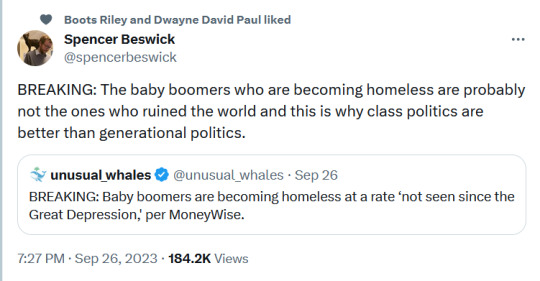
#twitter#tweet#tweets#boomers#economics#economy#homeless#class politics#generational politics#class#inequality#wealth inequality
51K notes
·
View notes
Text
285 notes
·
View notes
Text
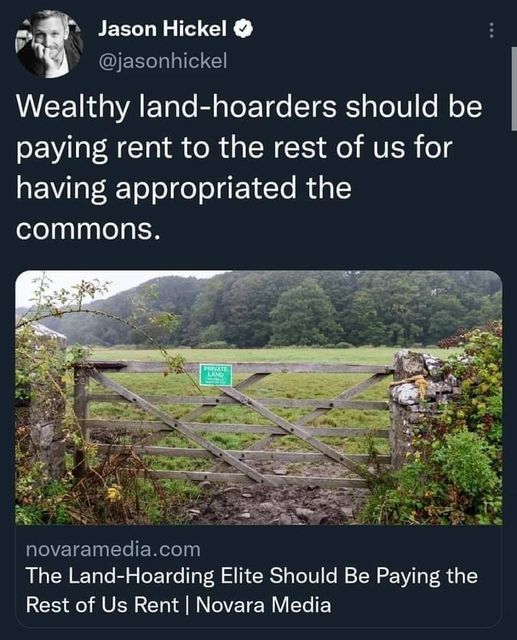
20K notes
·
View notes
Text
I feel like a good shorthand for a lot of economics arguments is "if you want people to work minimum wage jobs in your city, you need to allow minimum wage apartments for them to live in."
"These jobs are just for teenagers on the weekends." Okay, so you'll use minimum wage services only on the weekends and after school. No McDonald's or Starbucks on your lunch break.
"They can get a roommate." For a one bedroom? A roommate for a one bedroom? Or a studio? Do you have a roommate to get a middle-wage apartment for your middle-wage job? No? Why should they?
"They can live farther from city center and just commute." Are there ways for them to commute that don't equate to that rent? Living in an outer borough might work in NYC, where public transport is a flat rate, but a city in Texas requires a car. Does the money saved in rent equal the money spent on the car loan, the insurance, the gas? Remember, if you want people to take the bus or a bike, the bus needs to be reliable and the bike lanes survivable.
If you want minimum wage workers to be around for you to rely on, then those minimum wage workers need a place to stay.
You either raise the minimum wage, or you drop the rent. There's only so long you can keep rents high and wages low before your workforce leaves for cheaper pastures.
"Nobody wants to work anymore" doesn't hold water if the reason nobody applies is because the commute is impossible at the wage you provide.
95K notes
·
View notes
